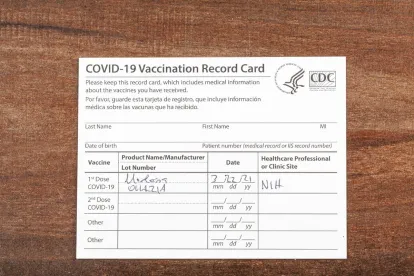On August 3, 2021, New York City Mayor Bill de Blasio announced that proof of vaccination would be required for individuals to enter certain indoor establishments. In a first-of-its-kind mandate, New York City officially implemented the “Key to NYC” through Emergency Executive Order 225, which became effective on August 17, 2021.
Covered Establishments
The executive order requires certain types of indoor entertainment, recreation, dining, and fitness establishments to verify that staff and patrons have received “at least one dose of a COVID-19 vaccine.” Examples of affected business include, but are not limited to the following.
Indoor Dining
-
Restaurants
-
Catering halls
-
Bars
-
Nightclubs
-
Cafeterias
-
Coffee shops
-
Fast food/quick service with indoor dining
Indoor Entertainment
-
Movie theaters
-
Music and concert venues
-
Museums
-
Zoos
-
Convention centers
-
Performing arts theaters
-
Bowling alleys
-
Arcades
Indoor Fitness
-
Gyms
-
Fitness classes
-
Pools
-
Dance studios
The order provides exemptions for residential buildings, office buildings, public and private schools through grade 12, and community centers from the mandate.
Proof of Vaccination
All employees, customers, and contractors (who reside in New York City) must provide proof of at least one dose of vaccination before entering any of the covered establishments. The following individuals are exempt from showing proof:
-
Children under the age of 12 ;
-
Individuals, including suppliers and vendors, entering businesses for a limited time and for a limited purpose;
-
Performing artists who do not reside in New York City and are not regularly employed by the relevant covered entity;
-
Professional athletes and members of professional sports teams who do not reside in New York City and enter the relevant covered premises for the purpose of competing;
-
Individuals accompanying performing artists, members of a sports teams, or professional athletes as part of their regular employment during a performance or competition and who do not reside in New York City; and
-
Contractors who do not reside in New York City.
Exempt individuals who enter covered establishments must continue to wear face masks when unable to maintain six feet of social distance from other individuals. Employees and patrons can show proof of vaccination via their vaccination record card, the New York City COVID Safe app, New York State Excelsior app, or an official immunization record. According to the executive order, relevant covered establishments for dining, fitness, and entertainment may deny entry to individuals who refuse to show proof of vaccination.
However, individuals may be permitted to enter establishments without proof of vaccination for a “quick and limited purpose” (e.g., to use to bathroom, pick-up food, etc.) if they continue to don facial coverings when unable to maintain six feet of social distancing. For any individual who appears to be 18 years of age or older, the establishment must also verify that the individual’s identification card (e.g., driver’s license, passport, etc.) bears “the same identifying information as the proof of vaccination.”
Reasonable Accommodations
Businesses must comply with the applicable provisions of the New York City Human Rights Law (NYCHRL) to ensure that they do not treat customers or employees differently based on any protected characteristics, such as disability, religion/creed, race, gender, etc. For example, a business may not require proof of vaccination only from employees of one race and not those of other races.
Businesses that become aware that a customer, employee, contractor, or intern is “unable to show proof of vaccination because of a disability, pregnancy, religious belief, or … status as a victim of domestic violence, stalking, or sex offenses” are required by the NYCHRL to engage “in a cooperative dialogue” and consider reasonable accommodations where appropriate. Employers do “not have to provide a reasonable accommodation if doing so would create a direct threat to other customers or employees of the business, or impose an undue hardship.”
If an employee is unable to provide sufficient proof of vaccination, employers may want to speak with the employee to determine why the employee does not have the required proof. If the reason is for one of the protected reasons identified above, employers are required by law to engage in cooperative dialogue and determine if reasonable accommodations are available. Employers may request documentation from employees seeking reasonable accommodations. Such documentation includes but is not limited to, a note from a medical provider or related service provider.
Where a reasonable accommodation is not available to allow the employee to continue to perform his or her job duties without posing a direct threat or an undue hardship, employers may consider offering the employee a leave of absence until he or she is able to either provide proof of vaccination or it is otherwise safe for the employee to return to work.
Required Signage and Documentation
Affected businesses must “post a sign in a conspicuous place” that notifies employees and customers about the mandatory vaccination requirement. Businesses may use the New York City Department for Health and Mental Hygiene sign or may create its own sign with required language that advises individuals where to obtain free COVID-19 vaccine appointments.
Business must also maintain documentation on their “protocol for implementing and enforcing the vaccine requirement.”
Enforcement
Enforcement will begin on September 13, 2021 with non-compliant employers subject to a fine, penalty, and forfeiture of not less than $1,000. Subsequent violations within 12 months of an initial violation are subject to fine, penalty, and forfeiture of no less than $2,000 for the second penalty and $5,000 per violation thereafter.
Related Developments
On August 17, 2021, the Independent Restaurant Owners Association Rescue, in addition to several restaurants and fitness facilities, filed suit in Richmond County against the City of New York and Mayor de Blasio seeking a permanent injunction against the executive order. They argue that the mandate violates the Equal Protection Clause of the U.S. Constitution in that it interferes with the impacted businesses’ “right to pursue a lawful calling and livelihood” and therefore cannot survive strict scrutiny. The plaintiffs also argue that the mandate fails to make any exceptions for individuals who cannot be vaccinated (for religious reasons or because of pre-existing conditions) or should not be vaccinated (because they have natural antibodies from having had, and recovered, from COVID-19).
On August 16, 2021, Governor Cuomo announced a COVID-19 vaccine mandate for “all healthcare workers in New York State, including staff at hospitals and long-term care facilities, including nursing homes, adult care, and other congregate care settings,” by September 27, 2021. The New York State Department of Health will issue Section 16 Orders mandating these healthcare facilities “to develop and implement” policies requiring employee vaccinations. While the health department has yet to issue these orders, healthcare employers may want to continue to monitor the latest developments in this area.
Key Takeaways
Employers in New York may wish to review the above requirements to ensure that their practices comply with the obligations articulated in the order. Employers may also want to stay updated as the Key to NYC continues to evolve.





 />i
/>i
